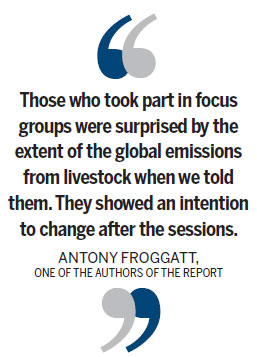Report: Cut the meat to cut greenhouse emissions

Analysis suggests China is well placed to help tackle climate change
A new research report suggests eating less meat could help cut global greenhouse gas emissions - and says people in China are more likely to heed the alert because they trust official reports.
The claims, made in a report by London-based think tank Chatham House, came just a week before world leaders were due to gather in Paris to thrash out a new climate deal.
| China is the largest consumer of meat, and the report suggests the country is among those offering the best hope for behavioral change. Yu Fangping / For China Daily |
Cutting overall consumption of meat would not only mean healthier diets, but also would close the gap between nations' current emissions-reduction targets and what is actually needed to prevent or slow down climate change, according to the report, Changing Climate, Changing Diets: Pathways to Lower Meat Consumption.
The analysis shows that livestock is already responsible for 15 percent of all greenhouse gas emissions and that demand for meat products is continuing to rise worldwide.
However, while China is the largest consumer of meat, the report says a multinational survey and focus groups to gauge public awareness have suggested that the country is among those offering the best hope for behavioral change.
Compared with people in the United Kingdom and United States, where climate change is seen as a politicized issue, researchers found that in China "there is strong public feeling" on issues such as deforestation and pollution, and "a focus on these concerns and their links with climate action and dietary change is likely to gain considerable traction".
The report says cutting the amount of meat the world eats could generate more than one-fourth of the emissions reductions needed by 2050 to keep global warming below the "danger level" of 2 C, a key goal of the Paris negotiations.

"People need to understand the link between climate change and meat consumption," says Antony Froggatt, one of the authors of the report, although he insists it does not mean everyone needs to become a vegetarian.
In general, he says, people have little understanding of climate change, linking it only to the use of electricity or to vehicle emissions, but not to livestock.
The Chinese public is identified in the report as having a low level of awareness but a strong level of trust for international bodies, therefore more likely to be trusting of such research.
"Those who took part in focus groups were surprised by the extent of the global emissions from livestock when we told them. They showed an intention to change after the sessions," Froggatt says.
However, while the Chinese government does have clear dietary guidelines on what people should be eating to stay healthy, he says it fails to take into account a key factor: long-term sustainability.
Raising awareness is a good start, but "unless they are sustainable, dietary recommendations are of no value", he adds.
Antoine Flahault, director of the University of Geneva's Institute of Global Health, agreed that cutting down on meat could lead to substantial benefits in the health and climate of countries with heavy consumption.
"For example, it's been estimated that in the UK a cut by 30 percent in red-meat consumption could reduce greenhouse gas emissions by 40 percent," he says. "In many countries we could eat a bit less to have a healthier diet."
Contact the writer through newsroom@chinadailyuk.com
For China Daily
(China Daily European Weekly 11/27/2015 page23)
Today's Top News
- Japan tempting fate if it interferes in the situation of Taiwan Strait
- Stable trade ties benefit China, US
- Experts advocate increasing scope of BRI to include soft power sectors
- New engine powers cargo drone expansion
- China to boost green industry cooperation
- Manufacturing PMI rises in November































